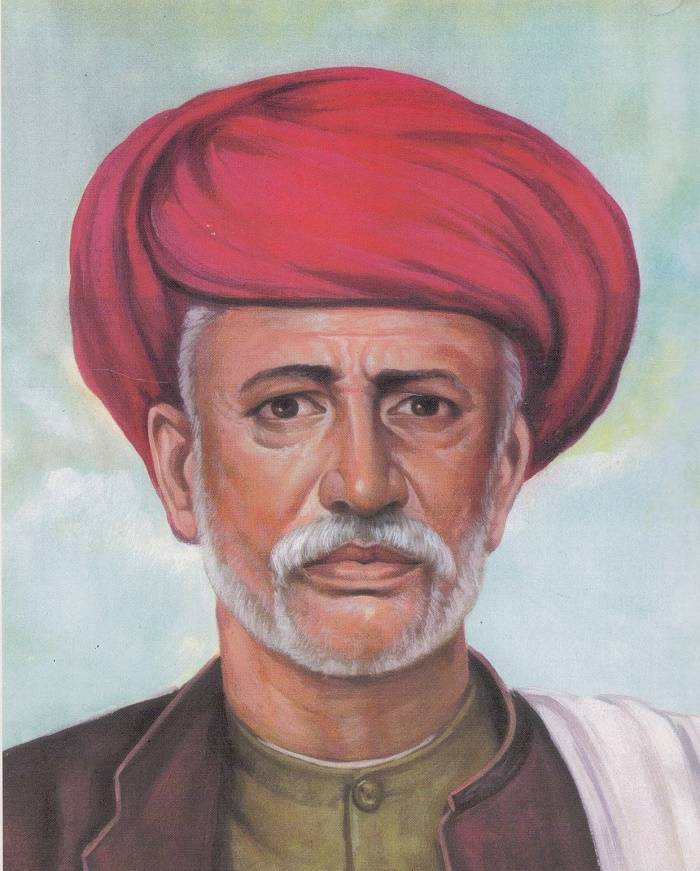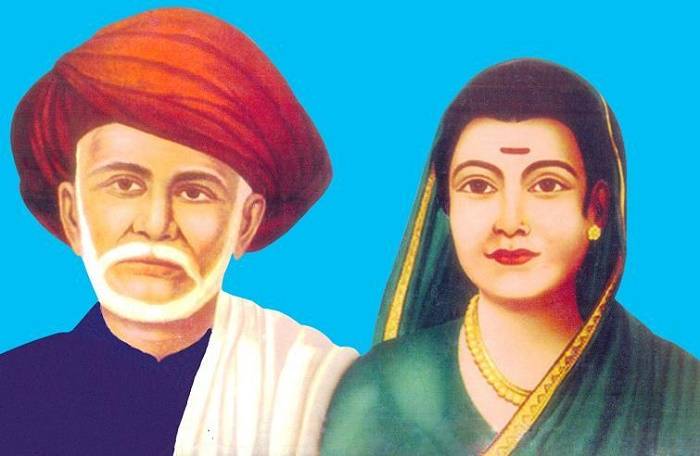JYOTI RAO PHULE

- Jyotirao Govindrao Phule was born in the Satara district of Maharastra in 1827. His father, Govindrao was a vegetable vendor at Poona
- Jyotirao's family belonged to the 'mali' caste and their original title was ‘Gorhay’. Malis was considered an inferior caste by the Brahmins and was shunned socially. Jyotirao's father and uncles served as florists, so the family came to be known as `Phule'. Jyotirao's mother passed away when he was just nine months old
- In 1841, Jyotirao got admission in the Scottish Mission's High School, Poona, and completed his education in 1847. There, he met Sadashiv Ballal Govande, a Brahmin, who remained his close friend throughout his life. At the age of just thirteen years, Jyotirao was married to Savitribai

- In 1848, an incident sparked off Jyotiba’s quest against the social injustice of caste discrimination and incited a social revolution in the Indian society
- Jyotirao was invited to attend the wedding of one of his friends who belonged to an upper-cast Brahmin family. But at the wedding, the relatives of the bridegroom insulted and abused Jyotiba when they came to know about his origins
- Jyotirao left the ceremony and made up his mind to challenge the prevailing caste system and social restrictions
- He believed that the enlightenment of the women and lower caste people was the only solution to combat the social evils
- Jyotiba’s quest for providing women and girls with right to education was supported by his wife Savitribai Phule. One of the few literate women of the time, Savitribai was taught to read and write by her husband Jyotirao
- In 1851, Jyotiba established a girls' school and asked his wife to teach the girls in the school. Later, he opened two more schools for girls and an indigenous school for the lower castes, especially for the Mahars and Mangs
- Jyotiba realised the pathetic conditions of widows and established an ashram for young widows and eventually became an advocate of the idea of Widow Remarriage
- Female infanticide was a common occurrence and so was child marriage, with children sometimes being married to men much older
- These women often became widows before they even hit puberty and were left without any family support. Jyotiba was pained by their plight and established an orphanage in 1854 to shelter these unfortunate souls from perishing at society’s cruel hands
- Jyotirao attacked the orthodox Brahmins and other upper castes and termed them as "hypocrites". He campaigned against the authoritarianism of the upper caste people and urged the "peasants" and "proletariat" to defy the restrictions imposed upon them
- He opened his home to people from all castes and backgrounds. He was a believer in gender equality and he exemplified his beliefs by involving his wife in all his social reform activities
- He believed that religious icons like Rama are implemented by the Brahmin as a means for subjugating the lower caste
- The orthodox Brahmins of the society were furious at the activities of Jyotirao. They blamed him for vitiating the norms and regulations of the society
- Many accused him of acting on behalf of the Christian Missionaries. But Jyotirao was firm and decided to continue the movement. Interestingly, Jyotirao was supported by some Brahmin friends who extended their support to make the movement successful
- In 1873, Jyotiba Phule formed the Satya Shodhak Samaj (Society of Seekers of Truth)
- He undertook a systematic deconstruction of existing beliefs and history, only to reconstruct an equality promoting version. Jyotirao vehemently condemned the Vedas, the ancient holy scriptures of the Hindus
- He traced the history of Brahmanism through several other ancient texts and held the Brahmins responsible for framing the exploitative and inhuman laws in order to maintain their social superiority by suppressing the "shudras" and “atishudras” in the society
- The purpose of the Satya Shodhak Samaj was to decontaminate the society from caste discrimination and liberate the oppressed lower-caste people from the stigmas inflicted by the Brahmins
- Jyotirao Phule was the first person to coin the term ‘Dalits’ to apply to all people considered lower caste and untouchables by the Brahmins
- Membership to the Samaj was open to all irrespective of caste and class. Some written records suggest that they even welcomed participation of Jews as members of the Samaj and by 1876 the 'Satya Shodhak Samaj' boasted of 316 members
- In 1868, Jyotirao decided to construct a common bathing tank outside his house to exhibit his embracing attitude towards all human beings and wished to dine with everyone, regardless of their caste
|
For Prelims: Jyotirao phule, Satya Sodhak Samaj, Savitrabhai phule
For Mains: 1. Explain the Contributions of Jyoti rao phule towards Women Upliftment. Discuss the efforts for Caste Discrimination (250 Words)
|
|
Previous Year Questions:
1.Satya Shodhak Samaj organized ( UPSC 2016)
A. a movement for upliftment of tribals in Bihar Answer (C) |




